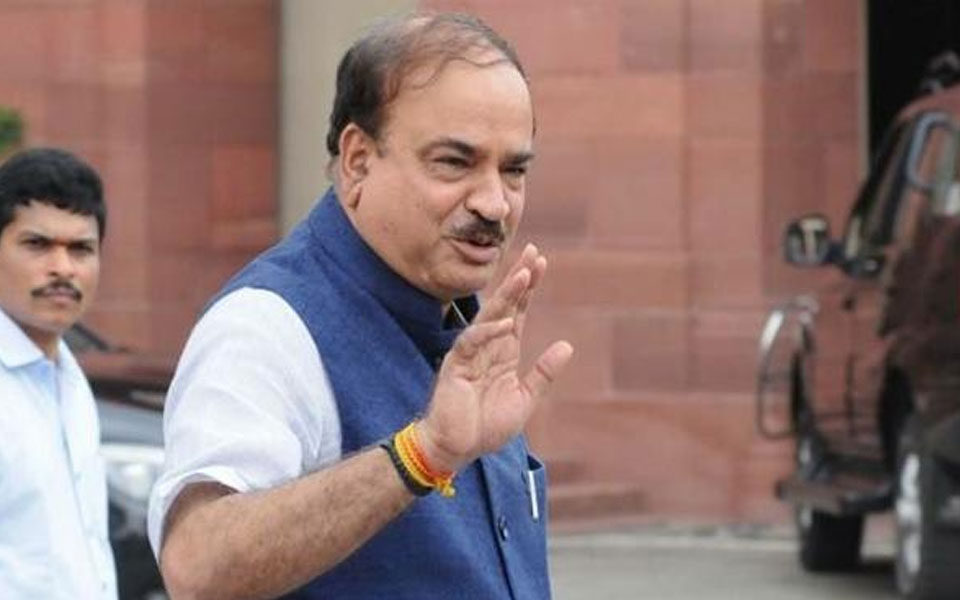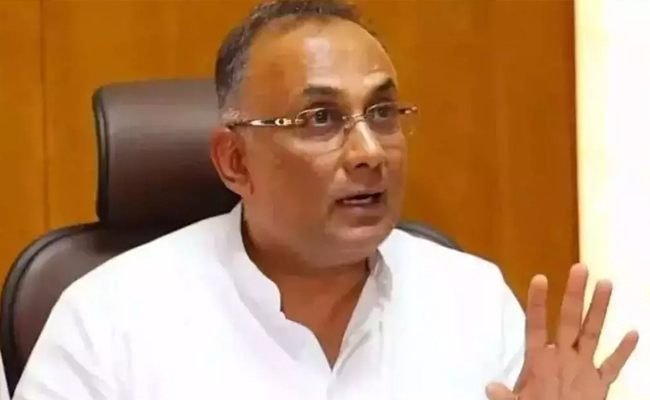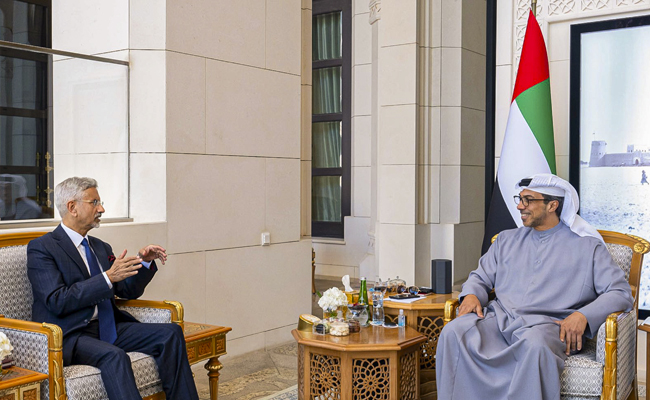Bengaluru, Nov 12 : A staunch RSS ideologue, a hard boiled organisation man, Bengaluru's "most loved" MP and the first person to speak in Kannada in the United Nations are some of the connotations associated with Union Minister Ananth Kumar.
Known for his political adroitness, Kumar, a six-time member of Parliament, gregarious with strong political instincts, had managed to be in the inner circle of the central leadership of the BJP -- be it during the heyday of Atal Bihari Vajpayee or L K Advani and now Narendra Modi.
Born in a middle class Brahmin family on July 22, 1959, in Bengaluru to Narayan Shastri, a railway employee, and Girija N Shastry, his early education began under the guidance of his mother who herself was a graduate.
Graduate in Arts and Law, Kumar's journey into public life began due to his association with the Akhila Bharatiya Vidyarthi Parishad, a student organisation of the Sangh Pariwar, which he served in various capacities, including the state secretary and the national secretary.
Kumar had even demonstrated against the then Indira Gandhi government's imposition of Emergency and had also got imprisoned for it for about 30 days.
With his steady political growth, his association with the Sangh, where he was mentored politically, also grew stronger.
Looking for bigger ground in politics, Kumar joined the Bharatiya Janata Party in 1987, where he went on to to take up the responsibilities of state secretary, state president of the Yuva Morcha, general secretary and national secretary.
Along with state BJP chief Yeddyurappa, Kumar is among a few party leaders who can be credited for the growth of BJP in Karnataka, as they built the party from the scratch, which paved the way for the installation of the first ever saffron party government in the South.
Kumar began his parliamentary career when he got elected to Lok Sabha in 1996 from Bangalore South, the constituency which remained his strong fort till his passing sway, by winning it for six consecutive times.
He enjoyed the credit of being the "youngest" minister in the Atal Bihari Vajpayee's cabinet in 1998. He served as the Civil Aviation minister, also Minister for Tourism, Sports, Youth Affairs & Culture, Urban development & poverty alleviation.
Kumar, who also held positions in various parliamentary committees, was serving as the Union Cabinet Minister for Parliamentary Affairs and Chemicals and Fertilizers in the Narendra Modi led government, after winning the 15th Lok Sabha election from Bengaluru south by defeating IT Czar Nandan Nilekani.
He is widely credited for implementing Neem Coated Urea and setting up of Jan Aushadhi Kendras with focus on affordable quality health care.
While being the all important member of the BJP's parliamentary board, Kumar is often regarded as the "Delhi face" of the Karnataka BJP and also for the state government who could be counted upon for taking issues concerning Karnataka.
He is known to have had politically hostile relationship with Yeddyurappa on occasions and often faced accusations of meddling too much in Karnataka affairs, when the the Lingayat strongman was at the helm of affairs in the state as its Chief Minister.
Kumar is married to Dr Tejaswini and they have two daughters Aishwarya and Vijetha.
Kumar is the Chief Patron of Adamya Chetana, an NGO involved in social work which he runs along with his wife in the memory of his mother Girija Shastry.
Let the Truth be known. If you read VB and like VB, please be a VB Supporter and Help us deliver the Truth to one and all.
New Delhi: A bill to set up a 13-member body to regulate institutions of higher education was introduced in the Lok Sabha on Monday.
Union Education Minister Dharmendra Pradhan introduced the Viksit Bharat Shiksha Adhishthan Bill, which seeks to establish an overarching higher education commission along with three councils for regulation, accreditation, and ensuring academic standards for universities and higher education institutions in India.
Meanwhile, the move drew strong opposition, with members warning that it could weaken institutional autonomy and result in excessive centralisation of higher education in India.
The Viksit Bharat Shiksha Adhishthan Bill, 2025, earlier known as the Higher Education Council of India (HECI) Bill, has been introduced in line with the National Education Policy (NEP) 2020.
The proposed legislation seeks to merge three existing regulatory bodies, the University Grants Commission (UGC), the All India Council for Technical Education (AICTE), and the National Council for Teacher Education (NCTE), into a single unified body called the Viksit Bharat Shiksha Adhishthan.
At present, the UGC regulates non-technical higher education institutions, the AICTE oversees technical education, and the NCTE governs teacher education in India.
Under the proposed framework, the new commission will function through three separate councils responsible for regulation, accreditation, and the maintenance of academic standards across universities and higher education institutions in the country.
According to the Bill, the present challenges faced by higher educational institutions due to the multiplicity of regulators having non-harmonised regulatory approval protocols will be done away with.
The higher education commission, which will be headed by a chairperson appointed by the President of India, will cover all central universities and colleges under it, institutes of national importance functioning under the administrative purview of the Ministry of Education, including IITs, NITs, IISc, IISERs, IIMs, and IIITs.
At present, IITs and IIMs are not regulated by the University Grants Commission (UGC).
Government to refer bill to JPC; Oppn slams it
The government has expressed its willingness to refer it to a joint committee after several members of the Lok Sabha expressed strong opposition to the Bill, stating that they were not given time to study its provisions.
Responding to the opposition, Parliamentary Affairs Minister Kiren Rijiju said the government intends to refer the Bill to a Joint Parliamentary Committee (JPC) for detailed examination.
Congress Lok Sabha MP Manish Tewari warned that the Bill could result in “excessive centralisation” of higher education. He argued that the proposed law violates the constitutional division of legislative powers between the Union and the states.
According to him, the Bill goes beyond setting academic standards and intrudes into areas such as administration, affiliation, and the establishment and closure of university campuses. These matters, he said, fall under Entry 25 of the Concurrent List and Entry 32 of the State List, which cover the incorporation and regulation of state universities.
Tewari further stated that the Bill suffers from “excessive delegation of legislative power” to the proposed commission. He pointed out that crucial aspects such as accreditation frameworks, degree-granting powers, penalties, institutional autonomy, and even the supersession of institutions are left to be decided through rules, regulations, and executive directions. He argued that this amounts to a violation of established constitutional principles governing delegated legislation.
Under the Bill, the regulatory council will have the power to impose heavy penalties on higher education institutions for violating provisions of the Act or related rules. Penalties range from ₹10 lakh to ₹75 lakh for repeated violations, while establishing an institution without approval from the commission or the state government could attract a fine of up to ₹2 crore.
Concerns were also raised by members from southern states over the Hindi nomenclature of the Bill. N.K. Premachandran, an MP from the Revolutionary Socialist Party representing Kollam in Kerala, said even the name of the Bill was difficult to pronounce.
He pointed out that under Article 348 of the Constitution, the text of any Bill introduced in Parliament must be in English unless Parliament decides otherwise.
DMK MP T.M. Selvaganapathy also criticised the government for naming laws and schemes only in Hindi. He said the Constitution clearly mandates that the nomenclature of a Bill should be in English so that citizens across the country can understand its intent.
Congress MP S. Jothimani from Tamil Nadu’s Karur constituency described the Bill as another attempt to impose Hindi and termed it “an attack on federalism.”



_vb_22.jpeg)

